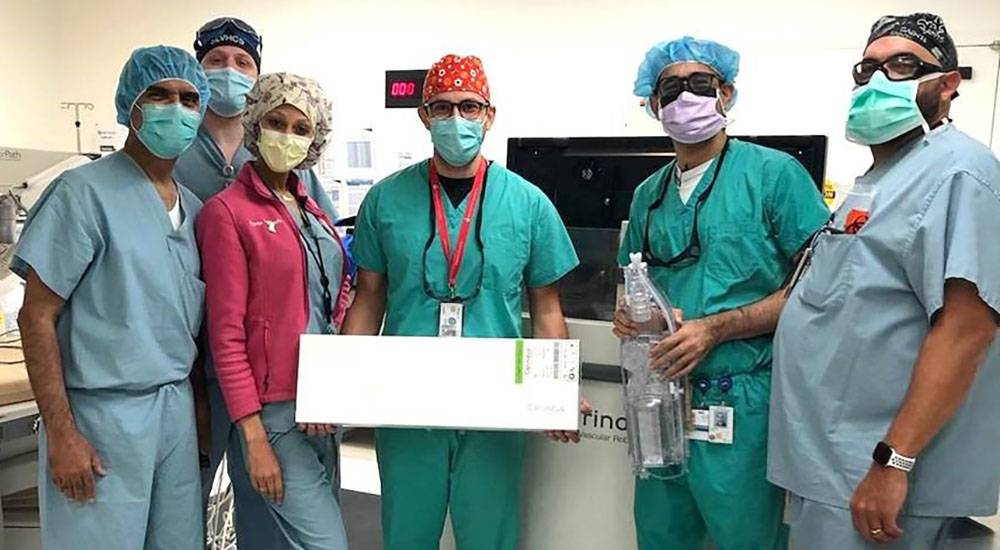The Cardiology Team at the Southeast Louisiana Veterans Health Care System in New Orleans has performed southeast Louisiana’s first percutaneous catheter intervention using robotic technology to open a Veteran’s blocked heart blood vessels.
Percutaneous catheter interventions are non-surgical procedures used to open-up these blocked heart blood vessels, saving the heart muscle from impending permanent damage.
During the procedure, doctors insert a balloon-tipped catheter into the blood vessels in the groin or arm. When the catheter reaches the heart at the point of the narrowed artery, doctors inflate the balloon tip with the stent, compressing the plaque and expanding the stent.
Once doctors correctly place it, the stent stays, and they deflated and withdraw the balloon.
Enormous impact for aging Veteran population
“With the aging Veteran population, the potential impact of this state-of-the-art technology is enormous,” said Chief of Cardiology Dr. Anand M. Irimpen. “There is very little tissue trauma and in experienced hands, it is a relatively quick procedure. People can literally gain a new lease on life overnight.”
Blockages in the heart vessels are usually due to progressive build-up of fat containing plaques over a period of years, which may lead to a heart attack due to clot formation leading to sudden occlusion of the blood vessel.
Robotic systems give the physicians additional “hands” with increased stability. These machines have movements that are accurate and executed within the precision of a submillimeter.
Remote control reduces radiation exposure
“An added benefit of this new technology is that it allows the physician to remotely control the catheter resulting in a significant reduction in radiation exposure for both the patient and the interventional cardiology team,” Irimpen said.
He is also professor of Medicine and Interventional Cardiology Fellowship Program director at the Tulane University Heart and Vascular Institute.
Drs. Asaad Nakhle and Hafiz Ghafoor assisted Irimpen.
The surgical and cardiology team also included Cardiology Fellows Dr. Daniel Harrison and Dr. Jason Stencel, Nurse Jeffrey Roussel, Patrice Plustache, R.T., Nurse Darren Untereiner and Bradley Fitzhenry, R.T.
Cardiovascular disease is the leading cause of death among Veterans, as it is in the general public. Timely interventions can lessen the impact of heart disease on health.
“Some of the best doctors and nurses in the country”
According to a 2021 presentation at the virtual Society for Cardiovascular Angiography and Interventions Scientific Sessions, robotic PCI systems are associated with high rates of clinical and technical success.
“This new technology increases accuracy and reduces procedure time, which means our patients have less tissue damage and less discomfort.
“We are proud the Southeast Louisiana Veterans Health Care System has some of the best doctors and nurses in the country and offers the latest, minimally invasive alternatives for our Veterans,” Irimpen said.
Topics in this story
More Stories
Veteran Byron Potier weighed almost 300 pounds and was tired and lethargic. He was the perfect candidate for gastric sleeve surgery.
How much do you know about VA care, benefits and services? Don’t miss out on what you've earned—check out the "2025 VA Federal Benefits Guide for Veterans, Dependents, Survivors, and Caregivers" handbook to learn more.
Feeling stressed? Your breath can help you relax and focus. Take 3 minutes to reset and prioritize your well being for this week's #LiveWholeHealth practice.







Congratulations.
What determines arm v. groin insinuation?
Will this procedure be available at other V.A. Hospital locations such as Boston?